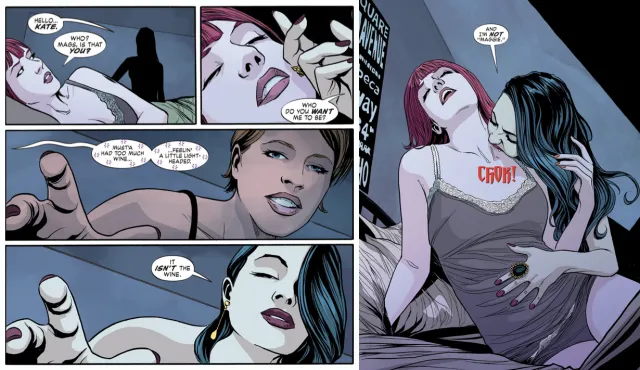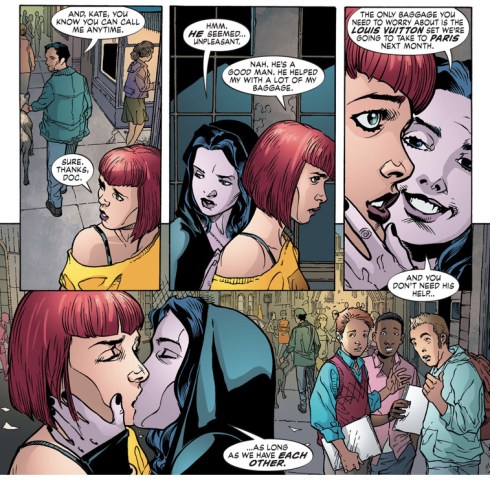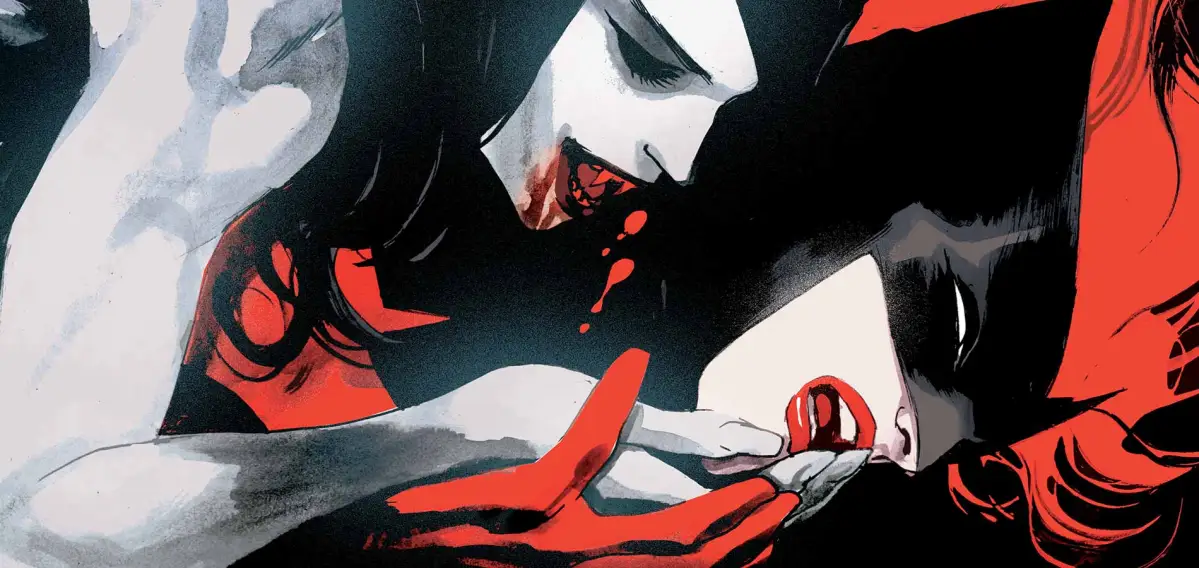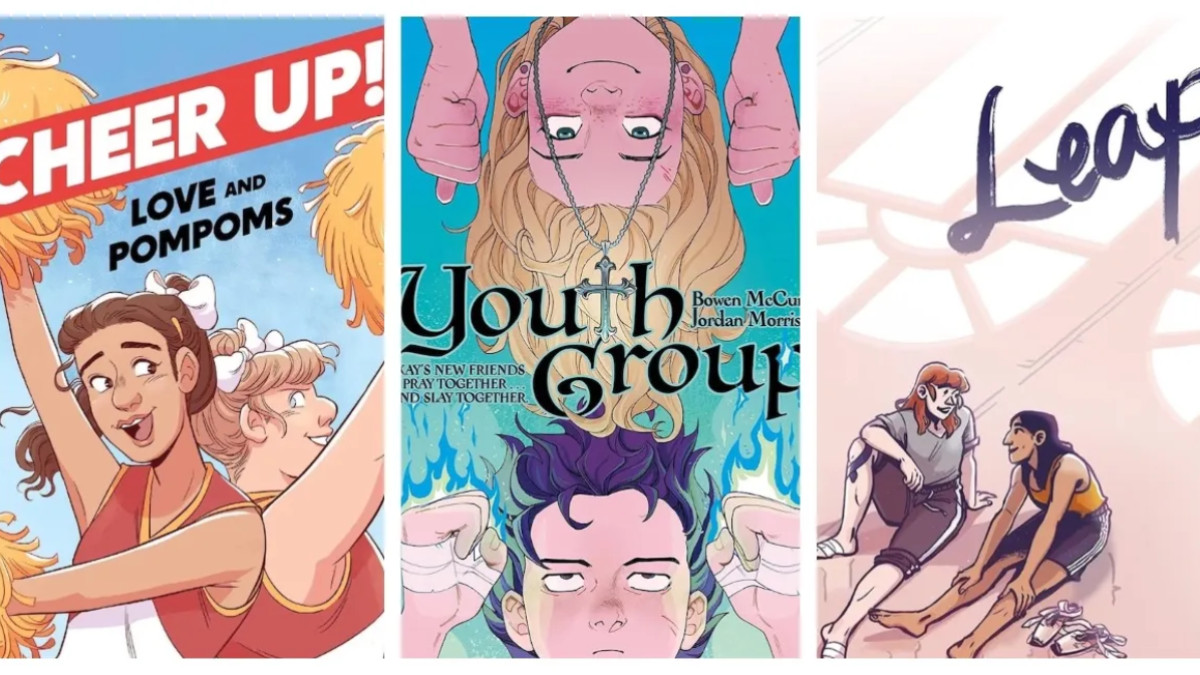DC Comics’ Batwoman title has made waves once again, but probably not how they intended.
In September 2013, the creative team of J.H. Williams III and W. Haden Blackman left Batwoman. In his blog, Williams said this decision was made after being told to change the direction of multiple stories at the last minute, each of which had been approved and planned out over a year beforehand with DC. The last straw was being told that Batwoman aka Kate Kane would not (again, as previously agreed) be allowed to marry her fiancée, Captain Maggie Sawyer of the Gotham City Police Department. A year later, with a new creative team of Marc Andreyko and Jeremy Haun, we see Kate break up with Maggie in Batwoman #34 and then, in the same issue, she is hypnotized to have sex with a villain.
I’m going to go into the details and context of this and will be showing a screen grab. Please be aware of this warning if discussions of rape acts as a trigger for you.
Why were Kate and Maggie prevented from getting married in the first place? Apparently, because DC entered into a new policy regarding marriage in their titles since the “New 52” reboot in 2011. That policy being, it’s simply not allowed with superheroes. Lois Lane was introduced as having a love interest and only seeing both Superman and Clark Kent as friends. Barry Allen was no longer married to Iris West and had only been on one date with her which ended badly. Aquaman and Mera were still romantically involved, but now they had never been married and were just living in delightful sin.
At Baltimore Comic-Con 2013, DC Comics co-publisher Dan Didio said:
“Heroes shouldn’t have happy personal lives. They are committed to being that person and committed to defending others at the sacrifice of their own personal interests . . . Dick Grayson . . . Bruce Wayne, Tim Drake, Barbara Gordon and Kathy Kane. It’s wonderful that they try to establish personal lives, but it’s equally important that they set them aside. That is our mandate, that is our edict and that is our stand.”
I think this logic is old-fashioned and limiting, encouraging the idea that all superheroes follow the same atmosphere and formula rather than embrace variety. But let’s get to the recent issue.
For a while, Maggie has been in a custody battle with her homophobic ex-husband James over their daughter Jamie (a similar custody battle was part of Maggie’s backstory when she was introduced in Superman comics in the 80s). James tells Kate he’ll stop fighting if she breaks up with Maggie, so her lesbian relationship doesn’t “endanger” little Jamie. Kate gives in and in issue #34 she breaks up with Maggie, saying it’s best they’re apart because now Maggie can devote her time to being a mother to Jamie rather than splitting her time between that and a relationship.
Kate’s therapist applauds the decision, though Kate is still, understandably, torn up about it. Then the next night, the vampire villain Nocturna, once a love interest to Batman, comes into our hero’s home. Nocturna saw Batwoman without a mask on during an earlier rooftop fight and recognized the famous Gotham socialite from the tabloids. Entering the apartment, she hypnotizes Kate/Batwoman to not fight back. Believing this is Maggie, Kate gives in and they embrace in a sexual way as Nocturna bites her neck. The issue ends.
 Skip ahead to Batwoman #36 (issue #35 is a separate story not connected to this arc). Kate has no memory of her sexual encounter with Nocturna (and certainly doesn’t know she’s a vampire) but is now dating her in their civilian identities. She’s apparently been hypnotized to not remember meeting Nocturna during the rooftop battle. The issue says they’ve been dating for about a month now. Kate seems very uncomfortable around Nocturna, possibly even fearful, but keeps giving into her rather than argue her own feelings. Later in the issue, Kate has a brief flashback of having sex with Nocturna while covered in blood. She has no idea what to make of it.
Skip ahead to Batwoman #36 (issue #35 is a separate story not connected to this arc). Kate has no memory of her sexual encounter with Nocturna (and certainly doesn’t know she’s a vampire) but is now dating her in their civilian identities. She’s apparently been hypnotized to not remember meeting Nocturna during the rooftop battle. The issue says they’ve been dating for about a month now. Kate seems very uncomfortable around Nocturna, possibly even fearful, but keeps giving into her rather than argue her own feelings. Later in the issue, Kate has a brief flashback of having sex with Nocturna while covered in blood. She has no idea what to make of it.
Obviously this arc isn’t going to be forever and Kate will discover the deception. It’s so obvious that I have to ask, why are we doing this story at all? What is there to be gained dramatically? This feels like another of many worn out rape stories which appear in horror and superhero stories, used for shock value and then quickly pushed aside for the sake of the next big story, with rare (if any) references to it again.
Yes, vampires are often used as a metaphor for rape. This is not a metaphor and it’s not seduction. Nocturna didn’t talk Batwoman into bed with charm. This wasn’t a character having a moment of weakness or a lapse in judgment because they felt vulnerable. Kate had her will and senses disabled by someone who then had sex with her and erased memory of the incident. Issue #36 also mentions that Kate’s been has had repeated blackouts recently, which means she’s likely been raped repeatedly.
 Yes, it’s in character for some villains and vampires to rape. That’s not the point. Is this really a more interesting story to tell than Maggie and Kate getting married? The Scarlet Pimpernel was married and later his wife worked alongside him on many adventures, but the costumed heroes who followed in his wake (Zorro, the Shadow, the Spider) started a trend that marriage was the end of the story, something that happened after you retired from being a superhero. They could have girlfriends and even fight crime alongside their fiancées, but being married and being a hero were mutually exclusive lives for some reason (because somehow a sidekick, partner or fiancée is less at risk than a spouse). Over three quarters of a century later, we should really get past this idea, especially when we have examples all across fiction that prove how great and entertaining it can be to see some heroes in healthy relationships and/or marriages. We should also get passed the idea of rape being a compelling bit of drama.
Yes, it’s in character for some villains and vampires to rape. That’s not the point. Is this really a more interesting story to tell than Maggie and Kate getting married? The Scarlet Pimpernel was married and later his wife worked alongside him on many adventures, but the costumed heroes who followed in his wake (Zorro, the Shadow, the Spider) started a trend that marriage was the end of the story, something that happened after you retired from being a superhero. They could have girlfriends and even fight crime alongside their fiancées, but being married and being a hero were mutually exclusive lives for some reason (because somehow a sidekick, partner or fiancée is less at risk than a spouse). Over three quarters of a century later, we should really get past this idea, especially when we have examples all across fiction that prove how great and entertaining it can be to see some heroes in healthy relationships and/or marriages. We should also get passed the idea of rape being a compelling bit of drama.
Marriage does not need to be the end of a story. It does not automatically limit a story. Marriage is still a relationship and relationships are abundant with dramatic possibilities. “Superhero” is not a strict genre and placing everyone under the same marital/love status quo is far more limiting than saying “some heroes get to have love, some get married, some don’t, some don’t choose it.” When you know that a story that would’ve really made Batwoman stand out from so many American superhero titles was sacrificed for something we’ve seen time and time again, (quite possibly to continued detriment of how society views and defines rape) it makes me angry at the comic instead of the villain.
That’s the wrong thing to feel.
[UPDATE] Others have also taken the story to be about rape and an abusive relationship. Writer Marc Andreyko has stated on Twitter this is not his intention. My view remains that the story conveys this, intentional or not.
@marcandreyko Can I ask a question about the current Batwoman story to clarify if my reaction to it makes sense?
— V. Scarlotte Rose (@Scarlotte_Rose) November 22, 2014
@Scarlotte_Rose absolutely not. their relationship is far more complicated that the "mindless slave" trope.
— Marc Andreyko (@marcandreyko) November 22, 2014
@Scarlotte_Rose @SirTrino sorry to hear that. and no one forces kate to do anything. you'll see if you stick around.
— Marc Andreyko (@marcandreyko) November 23, 2014
Alan Sizzler Kistler (@SizzlerKistler) is an actor and the author of Doctor Who: A History. He has spoken at the Paley Center for Media on the history of vampire myth and fiction.
Are you following The Mary Sue on Twitter, Facebook, Tumblr, Pinterest, & Google +?









Published: Dec 3, 2014 02:25 pm